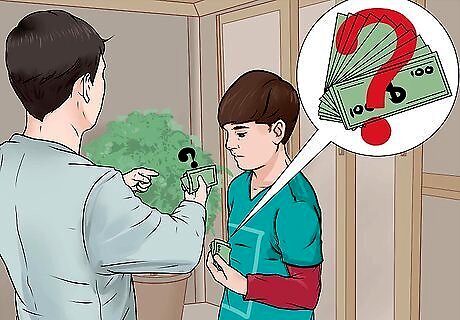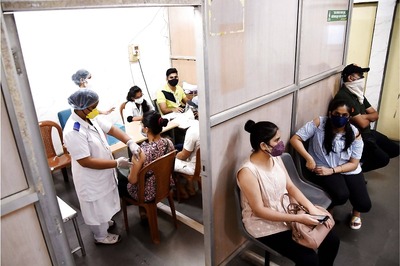
views
Punishing Your Teen For Stealing

Explain the consequences of stealing. Perhaps you discovered your teen was stealing money out of your wallet, or you found stolen goods in your teen's backpack. If your teen is a first time offender and has not been charged with a crime, it's important that you sit your teen down and explain how taking other people's property is illegal and could lead to jail time. Don't downplay the seriousness of the situation or coddle your teen into believing stealing is okay as long as you don't get caught. Be clear and forceful with your words as you explain the serious, potentially life altering consequences of stealing to your teen. Use legal terms to explain the possible jail time associated with committing larceny (which is when you steal property from someone, like a purse or a bicycle) and committing a felony (which is when you steal with the intent to deprive someone of money, such as taking someone's wallet or writing a bad check). The value of the stolen property will determine if the crime is considered a felony or a misdemeanor. Regardless of the level of the crime, your teen could be fined a steep amount or serve several months or years in jail if they are caught stealing.

Show your teen the consequences of stealing. Another method is to show, rather than tell, your teen what could happen if they are caught stealing. If your teen has stolen money or goods from you, some parents recommend calling the police and having a police officer mock arrest the teen. The officer may hand cuff your teen and place them in the back of the police car so they can explain what a felony charge is and how it can affect your teen's future. This may seem like an extreme tactic, and it should only be done if your teen has stolen from you directly as you are the one who will decide whether or not to press charges against your teen. However, this tactic can scare your teen so much that they may never even consider stealing again. If they have not stolen from you, try showing them prison documentaries or interviews with inmates. This will show them exactly what happens in prison and that could be them one day.

Impose a punishment that requires a positive action from your teen. Rather than enforcing a physical punishment or a shaming punishment that will cause your teen to become more angry and resentful, focus on creating a punishment that requires your teen to make up for stealing with a positive action. This will reinforce the damage that stealing does to the relationships with those around you, and allow your teen to learn the value of honesty. For example, you may have caught your teen stealing money from your purse. You may then punish them by having them pay back all the money they stole from you. This may take time, as they may need to get a job or do odd jobs to earn back the money. But they will learn the consequences of their actions, gain more responsibility by getting a job, and understand why it's wrong to steal. Another option is to have your teen pay back the money with doing extra chores around the house or cooking dinner for the family for a month. This way, they will be doing positive actions for others to make up for their mistake.
Preventing Your Teen from Stealing Again

Ask your teen why they feel they need to steal. Your teen may be motivated to steal due to other issues or problems. Identifying the root cause of your teen's actions will help you prevent your teen from stealing again. Teens tend to steal for several reasons, including: Peer pressure can be a big motivator for your teen's stealing. They may want the latest smart phone or the cool, new sneakers and feel the only way to get them is to steal them from others, or steal money from you to buy these items. A big part of adolescence is fitting in with peers, and your teen may feel pressure to have certain items so they can blend in with the other teens at school. The need for attention is another possible reason why your teen is stealing. Any attention from others, especially authority figures, can seem better to your teen than none at all. Your teen may be stealing because they know it will get your attention and make you notice them. Embarrassment or anxiety around certain items, like condoms, tampons, emergency contraception, or a pregnancy test, could lead your teen to steal these items. Your teen may be too embarrassed to go to the clinic for these items or to ask you for money for these things, so they feel their only resort is to steal them. The thrill of wrongdoing could also be a motivator for your teen. Often, teens enjoy the thrill of doing something wrong and participating in risky behavior. Most teens are interested in things that are off limits or considered wrong. So stealing may be one way they are pushing the boundaries and trying to see how much they can get away with.

Provide other sources of income for your teen. If your teen is stealing because they feel they cannot afford items their peers own, have your teen get a part time job after school or take up odd jobs to earn some money. This will help them learn responsibility and money management, and allow them the freedom to purchase items they want, rather than steal them. You want to suggest your teen create a budget and learn how to manage their money so they develop good money management habits.

Get your teen involved in healthy extra curricular activities. Encourage your teen to focus their energy on improving their skills and abilities with others in a productive way through joining a sports team or a club at school. This may help them connect with peers who are interested in other things besides material objects or the latest must-have items.

Spend quality time with your teen. Stealing can be seen as a cry for attention from your teen. Don't ignore this. Instead, try to spend quality time with your teen on a consistent basis. Show your teen you care about them and what they're interested in by suggesting you do a favorite activity together or you both go see a band they like. During this quality time, you may want to discuss contraception, condoms, tampons etc. with your teen if you find out embarrassment or shame was their reason for stealing. Let your teen ask specific questions and provide these items so your teen does not have to feel embarrassed about having them. Talk to your teen about sex if this is part of their motivation for stealing.

Speak to a family counselor or therapist if your teen keeps stealing. If you catch your teen stealing again, it may be time to reach out to a family counselor or a therapist. Some teens steal due to deeper issues that may require hands on therapy, with your family or at an individual level. Don't let your teen's stealing become a habit, as this can lead to more serious consequences and a skewed moral code for your teen. Some teens can develop kleptomania, a rare compulsive disorder where the person feels anxiety or tension before stealing and then feels relief or gratification after stealing. Talk to your doctor or a therapist if you suspect your teen may be developing this disorder.




















Comments
0 comment